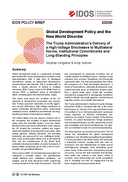
Global development policy and the New World Disorder: the Trump Administration’s delivery of a high-voltage shockwave to multilateral norms, institutional commitments and long-standing principles
Klingebiel, Stephan / Andy Sumner (2026)
Policy Brief 2/2026
Global development policy under Trump reveals crude transactionalism fused with authoritarian libertarian ideology. Since January 2025, US aid has been reshaped into an aggressive, nationalist tool of power—undermining multilateral norms, solidarity, and sustainable development worldwide.